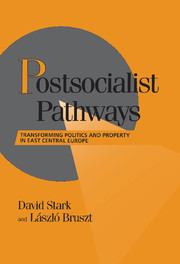Summary
In this book we examine the innovative character, born of necessity, of postsocialist institutions in East Central Europe, where actors are recombining economic assets and redefining political resources. The innovative character of this book is no less recombinatory for it rests on a long-term collaboration, born in the mid-1980s, well before the collapse of communism, through which we, an American economic sociologist and a Hungarian political scientist, mutually redefined our research agendas and our categories of analysis.
In our survey of the political and economic landscapes of contemporary Eastern Europe, we came to see forms of economic coordination that were alternatives to markets and hierarchies. In these deliberative associations, actors bound through associative ties make binding agreements. Our book is no less deliberative, for we are bound in networks of accountability that have constrained us from making precipitous judgments and helped shape a more coherent argument. Our associative ties have provided these enabling constraints. We are indebted first to the collegial networks in which we were embedded at our home institutions, Cornell University and the Central European University in Budapest. Ron Breiger, Béla Greskovits, Peter Katzenstein, Victor Nee, Jonas Pontusson, and Sidney Tarrow have offered insightful comments on various chapters and were stimulating interlocutors throughout the project.
We have also been bound in broader networks of extended accountability, as we have benefited from the criticisms and suggestions by discussants at various conferences and workshops where we presented earlier drafts of our chapters. Our thanks go especially to Ivan Berend, Grzegorz Ekiert, Gary Gereffi, Gernot Grabher, János Mátyás Kovács, Jan Kubik, Tony Levitas, Claus Offe, Ákos Róna-Tas, Andrzej Rychard, Philippe Schmitter, and Ivan Szelenyi. Because we can always count on her as our most persistent critic, we have inflicted more work-in-progress on Ellen Comisso than she might want to remember. Ellen has doubtless read every paragraph in this book more than once and, thanks to her, a good number were deleted. We are grateful for her consistent intellectual support and friendly encouragement.
For their comments and suggestions on drafts of various chapters, we thank Luc Boltanski, Rogers Brubaker, Janusz Dabrowski, Larry Diamond, Ilona Erös, Michal Federowicz, János Kornai, Janos Köllö, Peter Gedeon, Gerald McDermott, Sophie Muetzel, Peter Murrell, Guillermo O'Donnell, Peter Rutland, Arlene Saxonhouse, Mark Selden, Jan Szomburg, Marton Tardos, and Éva Voszka.
- Type
- Chapter
- Information
- Postsocialist Pathways , pp. ix - xiiPublisher: Cambridge University PressPrint publication year: 1998



